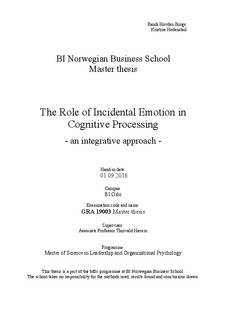| dc.description.abstract | With a between-subjects experimental design, the present study examined effects
of incidental emotions on cognitive processing in a subsequent decision-making
task. Rather than taking a purely valence-based approach, this study investigated
different aspects of emotional experience and its effects on cognitive processing.
Findings suggested that aspects other than incidental valence are indeed
important. As predicted, incidental arousal was negatively related to analytic
processing and positively related to intuitive processing. Both perceived and
physiological arousal were significant in explaining cognitive processing, whereas
perceived valence was insignificant in all models. Findings also indicated a
significant effect of certainty appraisals on analytic processing, but in opposite
directions than predicted. A nearly significant interaction effect between
physiological arousal and anticipated effort appraisals was also observed for
analytic processing. Overall, findings imply that studies may benefit from going
beyond valence when investigating emotion and its effects on cognitive
processing. Theoretical, methodological, and practical implications are discussed. | nb_NO |
